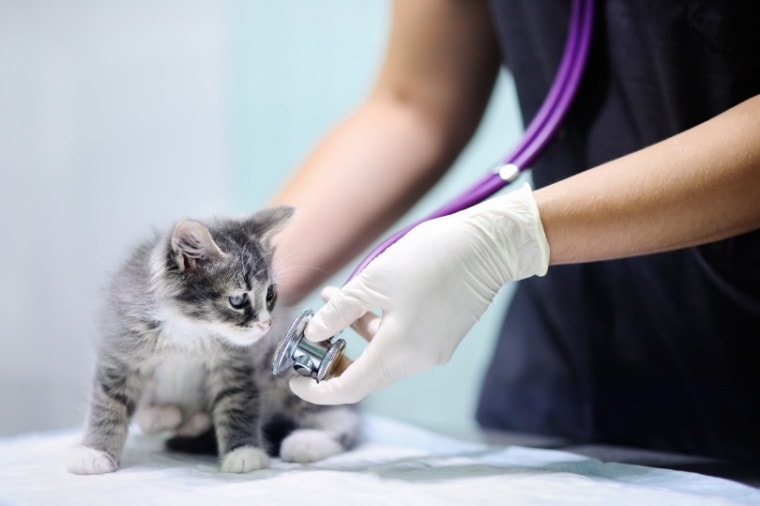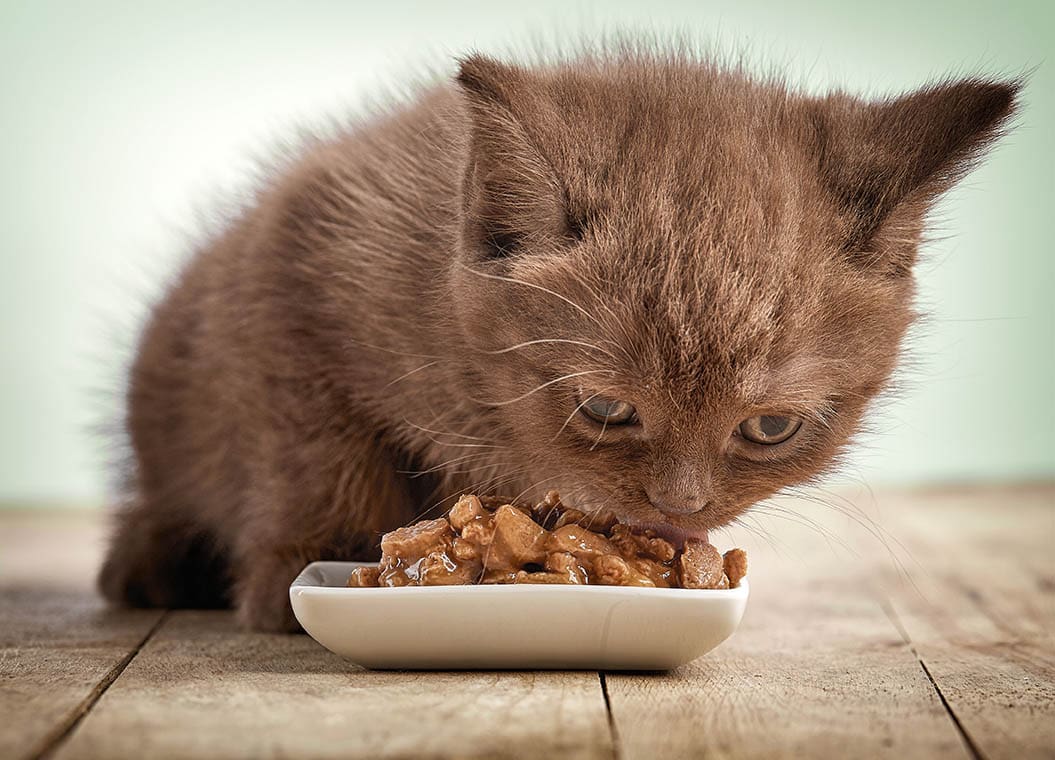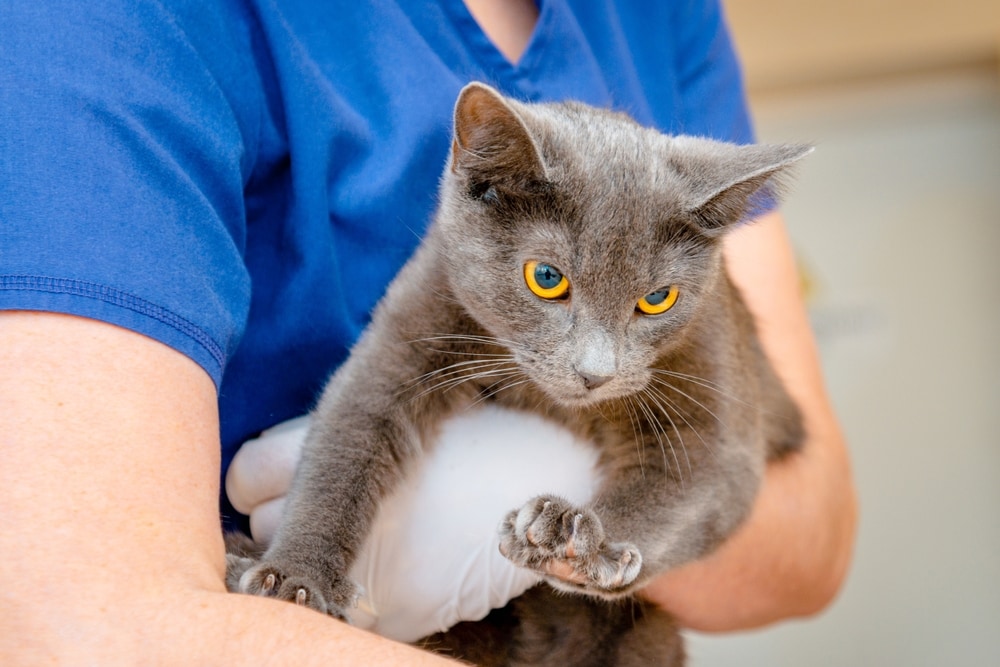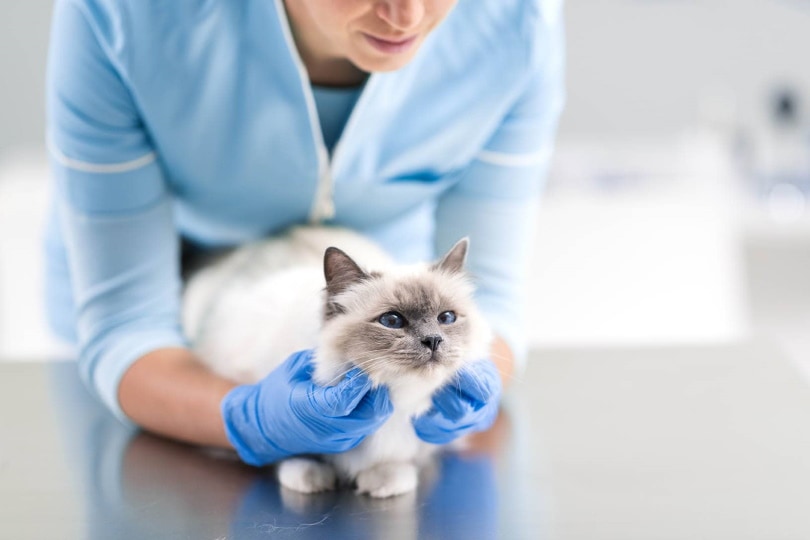
Bringing a new kitten home is exciting, but that happiness can quickly turn to concern if they start throwing up. Seasoned cat owners are all too familiar with cat vomit, and usually, there’s no reason to be concerned. However, new kitten owners can find this scary, especially if they don’t know the cause of the vomiting.
The good news is that cats sometimes throw up without being sick. If you’re unsure of why your kitten is throwing up, first contact your veterinarian for advice, especially if the vomiting is continuing or accompanied by diarrhea. In this article, we look at eight common reasons that your kitten is vomiting and what to do about it. Let’s get started.
The 8 Potential Reasons Your Kitten Threw Up
1. Parasites
All kittens should be dewormed by a veterinarian, starting at 2 weeks old. They will need multiple doses of deworming medication every 2 weeks until they reach 8 weeks old. Once they reach the appropriate age, cats should take year-round parasite preventatives that treat and prevent fleas, ticks, hookworms, and roundworms.
If your kitten wasn’t properly dewormed, these worms can grow inside of them until they cause health problems. One symptom of an internal worm infestation is vomiting. Sometimes, the kittens will throw up live worms that you can see in the vomit.
Other symptoms of intestinal parasites may include the inability to gain weight, diarrhea, a distended abdomen, and weakness. The worms prevent your kitten from getting the nutrition they need from their food. If left untreated, parasitic infections can be fatal for your kitten.
There is no guarantee that any dewormer bought over the counter or made at home will work as well as the one at your vet’s office. If your kitten is showing signs of an internal parasite infestation, there is no time to spare trying different things.
Take your kitten to the vet for a dewormer that will kill the worms effectively and quickly. Multiple doses may be required to eradicate all the worms. Your vet may also prescribe special food to bulk up your kitten’s nutrition. If your kitten is dehydrated from the infestation, they may need fluid administration and other medications. Since this condition is potentially life-threatening, we recommend seeing your vet as soon as possible.
Remember that even adult cats can get worms, so starting year-round parasite prevention as soon as your kitten is old enough is encouraged.
2. Food Allergies

Kittens that have food allergies or sensitivities may throw up from gastrointestinal distress. This can be accompanied by diarrhea, itchy or flaky skin, and hair loss. Food allergies can develop at any time in a cat’s life. They can appear suddenly, even if your cat was able to tolerate the same food with no issues in the past. If you’ve recently changed your kitten’s food and notice vomiting along with other symptoms, they may be allergic to an ingredient in the recipe.
Testing is necessary to determine the cause of the allergy. Your vet will likely suggest a food trial for 6–8 weeks to see if the symptoms resolve. If you go back to your kitten’s regular food and the symptoms return, your vet will be better able to know what your kitten is allergic to and what foods you should avoid.
Food allergies can’t be cured. You can only treat the symptoms by avoiding foods that contain the ingredients that your kitten cannot tolerate. Fortunately, there are many different foods available so you’ll be able to find one that works for your cat. Long-term diet maintenance is the way to control allergies. This means everything that your kitten eats, from cat treats to table scraps, should be carefully monitored to ensure that they aren’t consuming anything that will trigger them.
3. Hairballs
You might know that a cat’s tongue feels rough, but do you know why? They’re covered in papillae, which are little spines made of keratin. Their rough tongues help them eat and groom themselves thoroughly. Unfortunately, some of the hair that they pull out of their coats with their papillae as they lick their fur winds up getting swallowed. Some of this hair can be passed through their intestines and come out in their feces. Most of the hair, however, turns into a hairball in the stomach.
When this hair accumulates in the stomach, a cat’s natural way to get rid of it is to vomit it up. You can tell hairballs apart from regular vomit because you can easily see them. It looks like a tubular wad of fur, getting its shape as it’s forced through the esophagus. If a hairball is large enough and can’t be passed or vomited up, it can cause an intestinal blockage.
Brush your cat regularly to remove dead and loose hair. The more hair that you can remove from their coats, the less likely it will wind up in their stomach. If your cat is long-haired, you may consider keeping their coats trimmed or taking them for professional grooming sessions.
Many foods and treats have hairball formulas in them that are designed to reduce hairballs. They work to keep your cat’s coat healthy and minimize shedding while helping the ingested hair work its way through the digestive system.
Over-the-counter hairball remedies can also help the hair move through the intestines by working as a mild laxative. It lubricates the hair enough so it easily comes out in your cat’s poop. If you don’t want to change your cat’s diet, adding these remedies a few times a week can help control hairballs.
Your vet may be able to prescribe a hairball medication or a hairball-control food if you can’t find one that works.
4. Ingested Object

Kittens are playful and like to chew on things, sometimes even eating them. If you notice that pieces of your kitten’s toys are missing, there is a chance they were swallowed. Other things that your kitten may eat include:
Usually, you’ll be able to tell if this happened because you’ll see pieces of the objects in the vomit. If the ingested item is making your kitten sick, sometimes throwing up is the only remedy that you need. They’ll get it out of their system and immediately feel better. Sometimes, you’ll see the ingested items mixed with feces in your cat’s litter box.
However, if your kitten is vomiting repeatedly, unable to keep food down, and having diarrhea, this could mean the object is creating a blockage. Some objects can only be removed through a surgical procedure. Whatever your cat eats will have to come out some way or else it can cause a health problem.
Make sure your cat’s toys are safe for them to have, with no loose parts that they can easily eat. Keep all other items picked up and out of your cat’s reach.
If your kitten is vomiting and showing signs of distress, take them to the vet right away so they can determine if surgery is necessary to remove the object.
When you get home, we recommend using an enzyme cleaner to fully clean up your cat’s vomit.
If you're trying to find an enzyme cleaner that does it all, we highly recommend our favorite cleaner, the Hepper Advanced Bio-Enzyme Pet Stain & Odor Eliminator Spray.
- ADVANCED ENZYMATIC CLEANER - Penetrates the most stubborn smells and stains at the deepest molecular...
- FOR ANY MESS, ON ANY SURFACE - This pet odor eliminator cleans your carpets, floors, furniture,...
- FRESH, NATURAL ODOR - Our unique formulation doesn't rely on dangerous or unpleasant chemical...
It permanently removes the very worst stains and smells you can imagine and makes clean up a breeze. There's even a 100% satisfaction guarantee! Click here to order a bottle today.
At Pet Keen, we’ve admired Hepper for many years, and decided to take a controlling ownership interest so that we could benefit from the outstanding products of this cool cat company!
5. Infections
Bacterial and viral gastrointestinal infections can make kittens throw up. Some of these infections are contagious, so you may see these types of illnesses if your kitten is around other cats. If you recently adopted your kitten from a shelter, there is a chance that they caught it there. Boarding your kitten at a facility with other animals can also be a risk factor.
Many of these infections are short-lived and will clear on their own. However, if your kitten is experiencing frequent vomiting along with diarrhea or they can’t keep any food or water down, dehydration is a concern.
Bacterial infections can be treated with antibiotics from your vet. Viral infections can only have their symptoms treated and will have to run their course. If your kitten is dehydrated, they may need fluids delivered subcutaneously or intravenously. Your vet can also prescribe anti-nausea and appetite stimulant medications to help your kitten feel better and be able to eat.
6. Organ Disease

Kittens don’t often vomit due to disease, but it can happen. This is something more commonly seen in older cats. But any time your kitten vomits without you knowing why, is concerning. If your cat has a disease of the organs, such as kidney disease, it can cause a buildup of toxins in the blood. This can make your kitten feel nauseous, and vomiting is a result.
If you can’t figure out a cause for your kitten’s vomiting, a blood test may be necessary. Take your kitten to the vet for a full examination. The blood test will determine organ function, and your vet will have a better understanding of what’s happening inside your cat’s body.
If an organ disease is present and caught early enough, it can be controlled with medications and diet.
7. Cancer
This is an unlikely cause in kittens, but vomiting can be a symptom of cancer, especially if the cancer is in the digestive system. Throwing up is commonly associated with gastrointestinal lymphoma. Cancer can make kittens feel sick, which forces them to vomit. It can also lead to pain and discomfort in other areas of their bodies.
Cancer can only be diagnosed by your vet. Once the type of cancer is determined, a treatment course will be discussed. Cancer is treated using a variety of methods, including medications, chemotherapy, radiation, and/or surgery. Sometimes, hospice care is the only treatment option.
Cancer, like organ disease, is usually only seen in older cats. However, if your kitten is vomiting and showing other signs of being sick without an obvious cause, your vet will perform multiple diagnostic tests to find out what’s happening.
8. Eating Too Fast

Kittens can throw up because they eat too quickly. If your kitten is chowing down their meal, especially dry food, this can cause swelling in the stomach. Then, your cat receives a brain signal that they’ve overeaten, and their regurgitation reflex kicks in. Sometimes, your kitten will vomit after eating too fast and then go right back to eating more.
It can be frustrating when your kitten gulps their food, throws it up, and then begs for more because they’re still hungry. The best thing to do in this case is slow down their eating.
Slow-feeding bowls help stop your kitten from being able to gulp down food. They have to work harder to get their food, which forces them to eat it slowly. An automatic cat feeder is also helpful because it will dispense the proper amount of food at certain times.
Small meals throughout the day prevent the regurgitation trigger and still keep your cat feeling full. Measuring out their food for the day and dividing it into several small portions will help them stop vomiting after they eat.
When Should I Call the Vet?

If your kitten throws up, it can be difficult to know whether you should call the vet right away or wait and see if it happens again. Here are a few signs that you should call your vet or immediately bring your kitten in for treatment:
A good rule to follow is that any time you are in doubt, call your vet. They will be able to best advise you.
If your kitten vomits once and then appears to go back to their normal activity, this is likely not a cause for concern. If your kitten stops playing to throw up and then resumes playing and is happy, eating, and drinking, they are likely not sick.
However, if your kitten vomits, stops playing, becomes lethargic, doesn’t want to eat, or starts to hide, this requires a trip to the vet.
Conclusion
Kittens can vomit for many reasons. Some are nothing to worry about, while others can be more serious. If your kitten doesn’t stop throwing up or the vomiting is accompanied by other symptoms, take them to the vet right away. Remember to contact your vet any time you’re concerned about your cat’s behavior.
See also:
- Do Cats Vomit When Stressed? Deciphering Your Cat’s Behavior
- Is My Cat Sad or Depressed? 8 Signs to Look For (Vet Approved)
- Are Lilacs Poisonous to Cats? What You Need To Know!
- Are Majesty Palms Toxic to Cats? What You Need To Know!
Featured Image Credit: Maria Sbytova, Shutterstock








